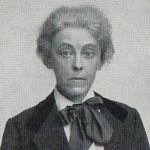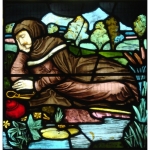Is it because your sable hair
Is folded over brows that wear
At times a too imperial air;
Or is it that the thoughts which rise
In those dark orbs do seek disguise
Beneath the lids of Eastern eyes;
That choose whatever pose or place
May chance to please, in you I trace
The noblest women of your race?
The crowd is sauntering at its ease,
And humming like a hive of bees—
You take your seat and touch the keys.
I do not hear the giddy throng;
The sea avenges Israel’s wrong,
You join me with a stately grace;
Music to Poesy gives place;
Some grand emotion lights your face.
At once I stand by Mizpeh’s walls;
With smiles the martyred daughter falls,
And desolate are Mizpeh’s halls!
Intrusive babblers come between;
With calm, pale brow and lofty mien,
You thread the circle like a queen!
Then sweeps the royal Esther by;
The deep devotion in her eye
Is looking “If I die, I die!”
You stroll the garden’s flowery walks;
The plants to me are grainless stalks,
And Ruth to old Naomi talks.
Adopted child of Judah’s creed,
Like Judah’s daughters, true at need,
I see you mid the alien seed.
I watch afar the gleaner sweet;
I wake like Boaz in the wheat,
And find you lying at my feet!
My feet! Oh! if the spell that lures
My heart through all these dreams endures,
How soon shall I be stretched at yours!















Comment form: